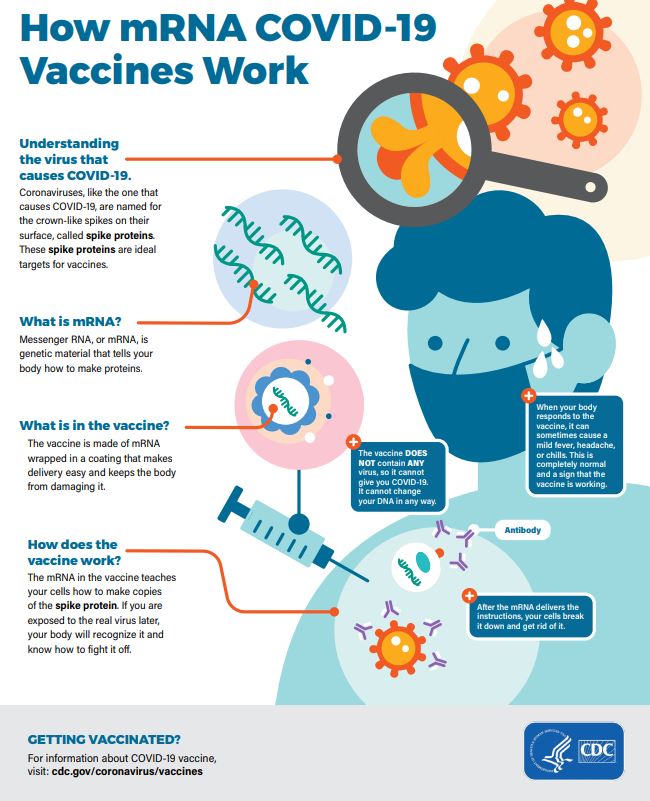mRNA Vaccines - New Technology in the Vaccine World
May 25, 2021
By Barret Procyshyn, Pharmacist at Dauphin Clinic Pharmacy
Vaccination has an interesting history dating back hundreds of years. Buddhst monks drank snake venom to obtain immunity and cowpox were smeared on open cuts to confer immunity to smallpox in China. Edward Jenner is considered the founder of vaccines as he inoculated a child with the cowpox virus and was demonstrated immunity to the smallpox virus. From there cholera, the plague, tetanus, and diphtheria vaccine development followed. These vaccines were far from perfect, no vaccine is, but there was a common theme; the medical world understood vaccination and disease prevention was far more effective than focusing on treatment. It saved lives. Many also feel it is the most natural way of preventing and then not having to treat disease, because you train your immune system and then let it take up the fight. This can be true when considering treating severe COVID-19 treatment as well. The medication and process required for ICU intubation is anything but natural. Most treatments are experimental so far, with little to no long-term data on their effects. When medications have proven to be much riskier from both short- and long-term use, vaccination in history has been shown to be quite safe.
Once our immune system is exposed to one or more doses of a vaccine, we typically remain protected against a disease for years, decades or even a lifetime. This is what makes vaccines so effective. Rather than treating a disease after it occurs, vaccines prevent us in the first instance from getting sick. Vaccinating against viruses gets tricky because virus trains develop variants, which the immune system might not be able to recognize. Because of this it may never be perfect science, but it is getting much better and just in time.
I must be honest; I had never heard of mRNA vaccination technology until COVID-19 hit, and I was quite doubtful it would be a game changer. We give the flu shot annually, and at best get 50-60% effectiveness during my time vaccinating with it. Historically, developing vaccinations was slow because the process had to start from scratch. However, I seem to be wrong, at least for the current common strains of COVID-19 in North America.
Messenger RNA vaccines (mRNA vaccines) are a new design of vaccines which take a different approach than traditional vaccines, which put a weakened or inactivated germ into our bodies to create the immune response. Messenger mRNA vaccines teach our cells how to make a protein or an ingredient of a protein which then triggers an immune response inside our bodies. That immune response, which produces antibodies, is what protects us from getting infected if the real virus enters our bodies. In the case of COVID-19, mRNA vaccines instruct our cells to make a harmless piece of the now famous spike protein. The spike protein is found on the surface of the virus that causes COVID-19. After the protein piece is made, the cell breaks down the instructions and gets rid of them. The protein piece (spike) is displayed on the cell and the immune system says "hey" this does not belong here and gets rid of it. Then it starts to remember and recall what happened and starts to produce antibodies. The process is much like getting COVID-19 and having your body learn to fight it off. The main difference is you do not get Covid-19 and are not at risk of severe illness.
It is important to note mRNA vaccines cannot give someone COVID-19 as they do not contain a live virus. These vaccines do not affect or interact with our DNA in any way. Like when we get a flu virus, COVID virus or even the cold sore virus the mRNA never enters the nucleus of the cell, where our genetic material is kept. Researchers have been studying and working with mRNA vaccines for decades. The mRNA vaccine technology is popular because vaccine production is quite simple. It allowed Pfizer and Moderna to produce enough vaccine for over 3 million Americans per day and now they are promising over 1 billion vaccines to low-income countries by the end of the year. They are so far showing to have better than expected effectiveness with two doses reaching as high as 95%. The true test will be to see how they hold up against the variants. For COVID-19 another big question is how well our immune system will be able to keep antibodies ready to fight from vaccination.
With mRNA vaccines showing promise in COVID-19 more attention is being paid to how we can put them to use for other diseases. Future mRNA vaccine technology may allow for one vaccine to provide protection for multiple diseases, thus decreasing the number of shots needed for protection against common vaccine-preventable diseases. Aside from vaccines cancer research has used mRNA to trigger the immune system to target specific cancer cells.
The Dauphin Clinic Pharmacy respects your decision to get vaccinated. We know vaccines are generally safe, but rare side effects can occur, and we know some people have concerns. We want to make sure you have the correct information available for you to make an informed decision. If you have questions, your pharmacist is available to help answer them.
The information in this article is intended as a helpful guide only. It is not intended to be used as a substitute for professional advice. If you have any questions about your medications and what is right for you see your doctor, pharmacist, or other health care professional.






 DCP on Facebook
DCP on Facebook